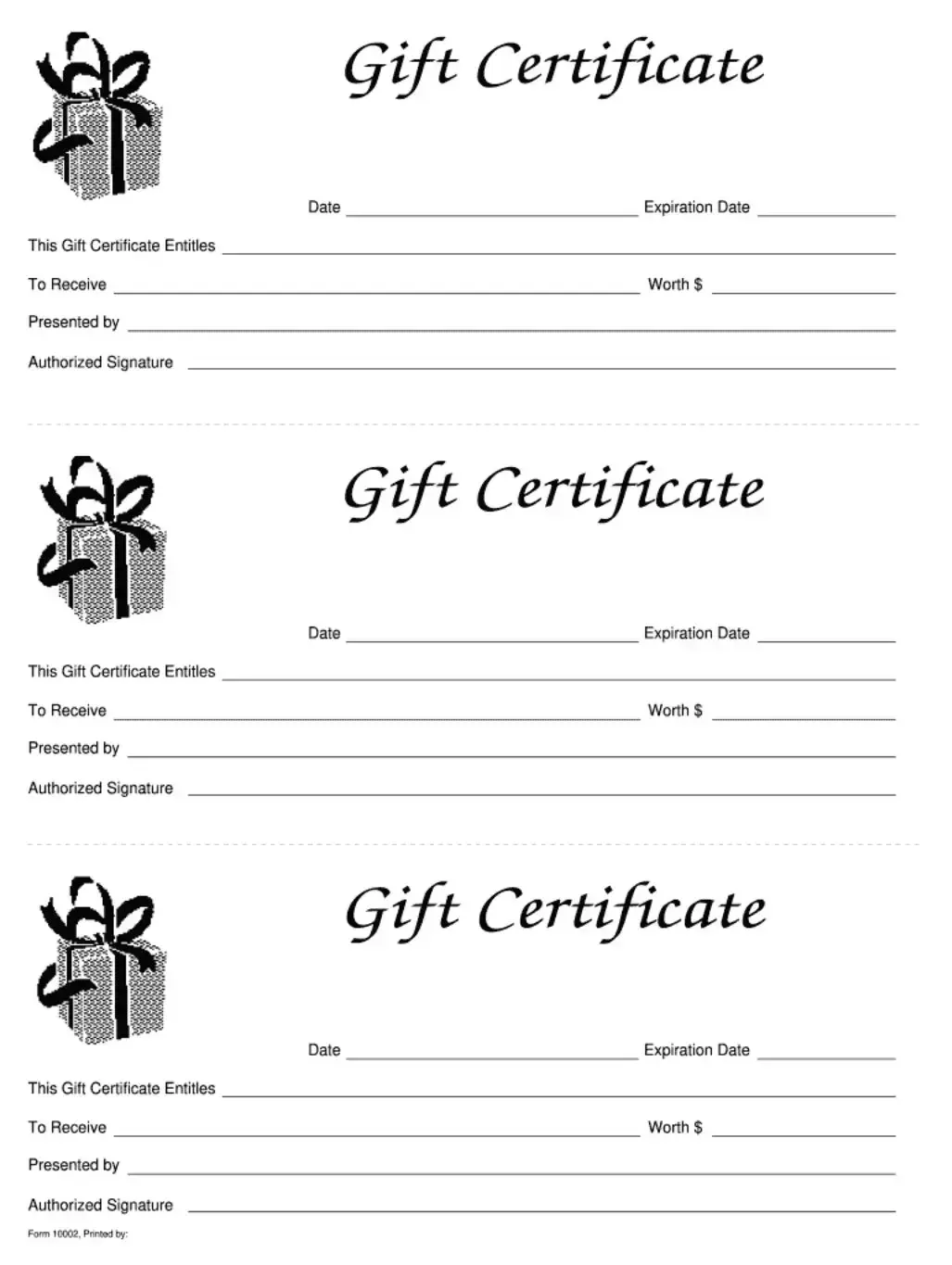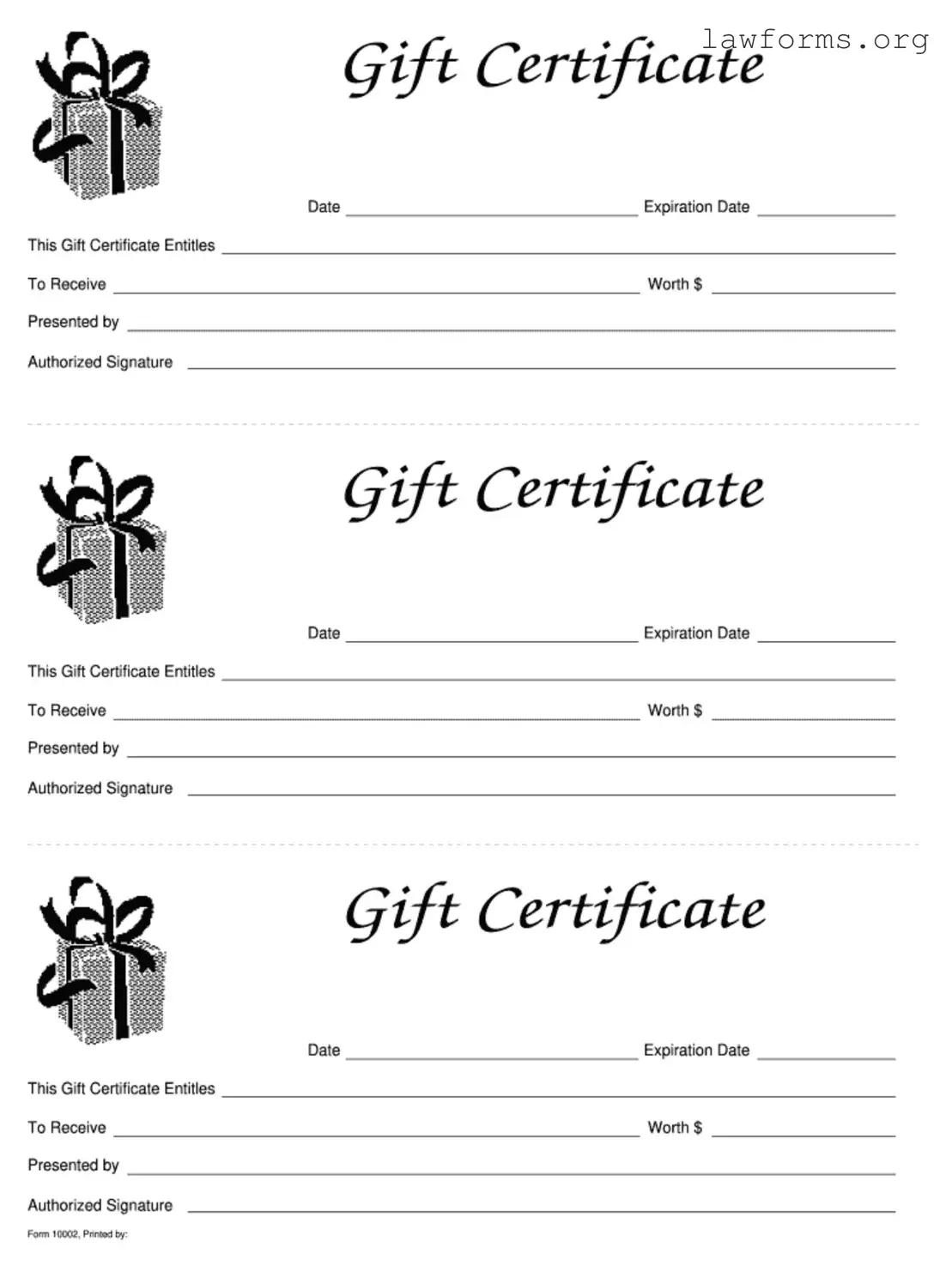Fill Out a Valid Gift Certificate Template
Form Specs
| Fact Name | Description |
|---|---|
| Definition | A gift certificate is a prepaid card or document that can be redeemed for goods or services. |
| Expiration Dates | Many states have laws regulating expiration dates on gift certificates, often prohibiting them from expiring within a certain period. |
| Fees | Some states restrict or prohibit fees associated with gift certificates, such as inactivity fees. |
| Transferability | Gift certificates are often transferable, allowing recipients to give them to others. |
| State-Specific Laws | Each state has different laws governing gift certificates, including rules on expiration and fees. |
| Federal Law | The Credit Card Accountability Responsibility and Disclosure Act of 2009 affects gift certificates, particularly regarding expiration dates. |
| Redemption | Gift certificates must be redeemable for cash or goods, depending on state laws. |
| Consumer Protection | Consumers have rights under various state and federal laws that protect them when purchasing or using gift certificates. |
| Documentation | Businesses must provide clear documentation regarding the terms and conditions of gift certificates at the time of sale. |
Dos and Don'ts
When filling out the Gift Certificate form, it is important to follow certain guidelines to ensure accuracy and efficiency. Below are some recommendations on what to do and what to avoid.
- Do: Read all instructions carefully before starting.
- Do: Double-check all information for accuracy.
- Do: Use clear and legible handwriting or type the information.
- Do: Keep a copy of the completed form for your records.
- Don't: Rush through the form; take your time to ensure everything is correct.
- Don't: Leave any required fields blank.
- Don't: Use abbreviations unless specified in the instructions.
- Don't: Forget to sign and date the form if required.
Other PDF Documents
Emotional Support Animal Letter From Therapist - Emotional support animals can play a role in helping individuals cope with trauma.
The New York Articles of Incorporation form is a critical document for businesses seeking to establish themselves as a corporation within the state. It outlines the necessary information and conditions required by the New York State Department of State for incorporation. For more guidance on how to complete this form effectively, you can refer to resources such as Formaid Org. Completing and submitting this form is the first step for entrepreneurs to legally recognize their business entity and protect their personal assets.
Trucking Companies With Lease Purchase - All notices must be directed to the appropriate parties as designated in the agreement.
CBP Declaration Form 6059B - Incomplete forms can lead to complications when passing through customs.
Common mistakes
-
Incorrect Recipient Information: Many people forget to double-check the spelling of the recipient's name. A small typo can lead to confusion and disappointment.
-
Missing Contact Details: It's essential to provide accurate contact information. Without a phone number or email address, the recipient might not receive important updates about the gift.
-
Choosing the Wrong Amount: Selecting an amount that doesn’t align with the occasion can lead to awkward situations. Make sure the value reflects the nature of the gift.
-
Not Specifying the Expiration Date: Some forget to clarify when the gift certificate expires. This can lead to frustration if the recipient tries to use it after the date.
-
Ignoring Terms and Conditions: Many overlook the fine print. Understanding the limitations and requirements can prevent misunderstandings later.
-
Inadequate Personal Message: A heartfelt note can make a gift special. Failing to include a personal touch can make the gift feel impersonal.
-
Choosing the Wrong Delivery Method: Some may not consider how the gift will be delivered. Opting for digital delivery when a physical card is preferred can diminish the experience.
-
Not Verifying Payment Information: Errors in payment details can lead to declined transactions. Double-checking this information is crucial for a smooth process.
-
Overlooking Customization Options: Many gift certificate forms offer customization. Not taking advantage of these options can result in a less meaningful gift.
-
Failing to Keep a Copy: It’s wise to retain a copy of the filled-out form. This can be helpful if there are any issues with the certificate later on.
Documents used along the form
When preparing a Gift Certificate, several other forms and documents may be beneficial to ensure a smooth transaction and clear communication. Each of these documents serves a specific purpose, enhancing the overall experience for both the giver and the recipient. Below is a list of commonly used forms that accompany a Gift Certificate.
- Purchase Agreement: This document outlines the terms and conditions of the gift certificate purchase, including the price, expiration date, and any restrictions on use.
- Recipient Information Form: Collecting details about the recipient, this form helps personalize the gift and ensures that the certificate reaches the intended individual.
- Terms and Conditions Document: This document provides important information about the usage of the gift certificate, including limitations, redemption procedures, and any applicable fees.
- Gift Certificate Holder: A physical or digital holder that presents the gift certificate in an attractive manner, enhancing the gifting experience.
- Thank You Card: Including a thank you card with the gift certificate adds a personal touch and expresses gratitude from the giver to the recipient.
- Refund Policy Statement: This statement clarifies the policy regarding refunds or exchanges related to the gift certificate, ensuring transparency for the purchaser.
Utilizing these additional documents can significantly enhance the process of gifting and receiving a gift certificate. By ensuring clarity and personalization, both parties can enjoy a more rewarding experience.
Misconceptions
When it comes to gift certificates, there are several misconceptions that can lead to confusion. Here are seven common myths about gift certificate forms:
-
Gift certificates never expire.
Many people believe that gift certificates are valid indefinitely. However, some states have laws that allow businesses to set expiration dates. Always check the terms and conditions.
-
All gift certificates can be redeemed for cash.
This is not true. Most gift certificates cannot be exchanged for cash, except where required by law. It's important to read the fine print.
-
Gift certificates are the same as gift cards.
While they serve similar purposes, gift certificates are often paper-based and may have different terms. Gift cards are usually plastic and can be used at multiple locations.
-
You can use a gift certificate for any purchase.
Some gift certificates are restricted to specific products or services. Always verify what the gift certificate can be used for before making a purchase.
-
Gift certificates are always transferable.
Not all gift certificates can be transferred to another person. Some are non-transferable, meaning only the original recipient can use them.
-
There are no fees associated with gift certificates.
Some gift certificates come with activation fees or maintenance fees that can reduce their value over time. Always inquire about any potential fees.
-
Once lost, a gift certificate is gone forever.
While losing a gift certificate can be frustrating, many businesses can issue a replacement if you have proof of purchase. Contact the issuer for assistance.
Understanding these misconceptions can help you make better decisions when giving or receiving gift certificates.
Preview - Gift Certificate Form

Key takeaways
When filling out and using the Gift Certificate form, keep these key takeaways in mind:
- Ensure all required fields are completed accurately to avoid delays in processing.
- Double-check the recipient's information, including their name and email address, to ensure delivery.
- Choose a clear and specific amount for the gift certificate to avoid confusion.
- Review the expiration date and any terms associated with the gift certificate before finalizing your order.
- Keep a copy of the confirmation email for your records and for any future reference.
- If you encounter any issues, reach out to customer support promptly for assistance.
Following these steps will help ensure a smooth experience with your Gift Certificate form.
Similar forms
Gift Card: Similar to a gift certificate, a gift card can be used as a form of payment at specific retailers or restaurants. Both allow the recipient to choose their own items, providing flexibility.
Store Credit: Store credit is issued when a customer returns an item without a receipt. Like a gift certificate, it can be used to make purchases, but it is typically tied to a specific store.
Vouchers: Vouchers are often used for discounts or specific products. They function similarly to gift certificates, as they can be redeemed for goods or services.
Prepaid Debit Cards: These cards can be loaded with a specific amount of money and used like cash. They share the same prepaid nature as gift certificates, allowing for purchases up to the card's balance.
Coupons: Coupons offer discounts on purchases. While they may not have a cash value like gift certificates, both provide a way to obtain goods or services without direct payment.
Membership Cards: Membership cards often grant access to exclusive deals or discounts. Similar to gift certificates, they provide value to the holder, encouraging purchases.
Event Tickets: Tickets for concerts or events allow entry into a venue. Like gift certificates, they represent a pre-purchase of a service or experience.
Travel Vouchers: These vouchers can be used towards travel expenses, similar to how gift certificates can be used for various purchases. Both offer recipients the ability to choose how to utilize their value.
Charity Donation Certificates: These certificates represent a donation made in someone’s name. They are similar to gift certificates in that they provide value, but the value is directed towards charitable causes.
